Over 200 Delegates Attend CBBC’s UK-China Business Forum in London
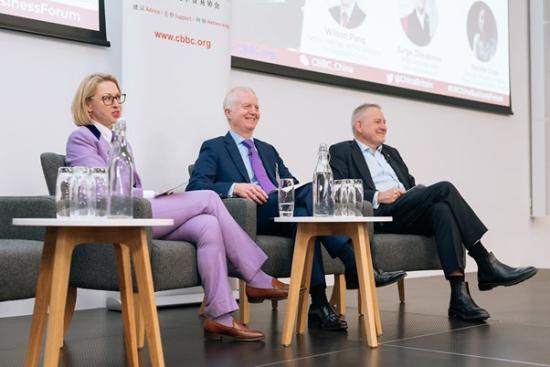
Speakers from Government, Industry, Finance, and Academia spoke on topics ranging from Green Finance to China’s dynamic consumer market, and technological collaboration.

Speakers from Government, Industry, Finance, and Academia spoke on topics ranging from Green Finance to China’s dynamic consumer market, and technological collaboration.
The full-day event was opened by CBBC’s Chair Sir Sherard Cowper-Coles who stated that: “There has never been a better opportunity for businesses to do business with China…We believe a positive trade and investment relationship can benefit both the UK and China.” Sir Sherard Cowper-Coles quoted the Government’s refreshed Integrated Review of Defence and Foreign Policy, which was released earlier in the week. The review stated that the Government “Will work with industry to make sure trade with China is safe and mutually beneficial.”
Sir Sherard went on to explain the importance of engaging with the world’s second largest economy. “Last year our exports to China rose to over £31 billion - supporting 130,000 UK jobs. But there is scope for much more”, he explained. “With 500 million middle class consumers, China’s spending power makes it a critical market. As the voice of business in China for over 65 years, CBBC has a key role in helping tackle the challenges our countries face”, he said. These challenges include dealing with technological change, targeting Net Zero, and addressing disparities on regional economic development.
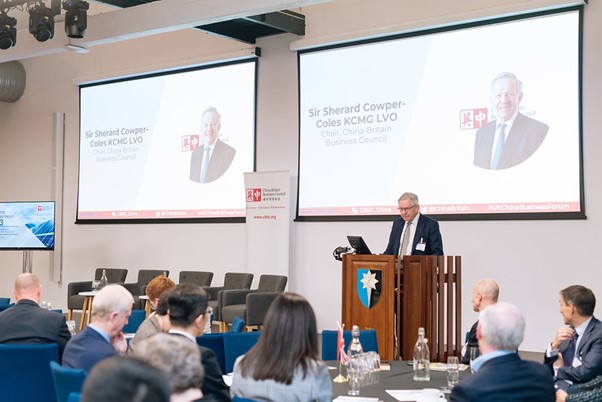
Sir Sherard Cowper Coles offered Opening Remarks at the Forum
Lord Johnson of Lainston, the Minister of State at the Department for Business and Trade, addressed the delegates, stating that the relationship between China and the UK remains significant. “The UK is one of the fastest growing sources of investment capital into China” he said. “Trade-wise our relationship with China is absolutely vital”.
Lord Johnson went on to say that in the UK we have the expertise in clean energy, life sciences, fusion, and other high-tech industries that China and the rest of the world needs.
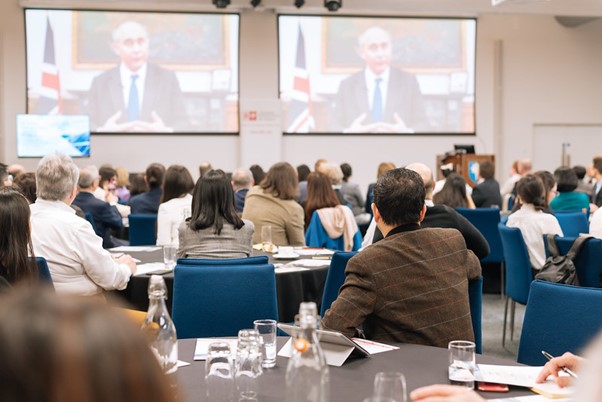
Lord Johnson of Lainston joins the Conference by Video Address
Dame Caroline Wilson, the British Ambassador to China, expressed her excitement at the chance to attend the Forum. “This is the first major conference for more than three years and a lot has changed in that period - global pandemics, supply chain issues, economic disruption – so thank you for your perseverance and professionalism” she told the audience.
“This week the British Government published a refresh of the Integrated Review in 2021 - which focuses on the global outlook for the UK and its place in the world and our goals and aspirations. China is an incredibly important part of that. The Review says that broadly the world has become a more dangerous place and the UK must face the realism that China has become more authoritarian at home and more assertive overseas” she said.
“A positive relationship can have a positive impact on both the UK and China and the government will work with trade to help make that happen.”
Dame Caroline Wilson went on to say that by 2030 China will be the world’s biggest economy with 23.5% of global GDP and half a billion consumers. She said that economic ties, from British exports to China, financial service solutions, technological, academic, and vocational education institutes - all benefit from this trade. “Chinese companies invest in UK offshore wind and charging stations to help reach Net Zero, and UK pharma is working with Chinese researchers to tackle diseases, and software companies are helping with the global digital transformation” she said. “The UK and China are helping to advance common global good to make our world a better place.”

Dame Caroline Wilson presenting at the Forum
Yang Xiaoguang Chargé d’Affaires at the Chinese Embassy in the UK told the audience that the CBBC has made important contributions to trade between the UK and China and welcomes further cooperation between the UK and China across all industries.
He explained that the recent Two Sessions set out GDP targets of around 5% growth with goals for 12 million new urban jobs as well as to keep personal income in step with economic growth. He went on to say that with quarantines no longer necessary upon entering China and visas being relaxed, China is open to entrepreneurs, investors and tourists.
Talking about the 45th anniversary of China’s Opening Up, he said that China will further reduce barriers to entry, including lowering tariffs and cutting down the negative list of items not able to be exported to China.
“We believe the CBBC, and the business communities will continue to play a role in promoting cooperation and good China-UK relations”, he said.

Yang Xiaoguang presents to delegates
The first session of the day was UK-China Relations and Trade Opportunities in a Post-Covid Era and was hosted by leading journalist, Jon Williams.
Jon Williams set the scene, quoting Prime Minister, Rishi Sunak who said last week that China poses an “epoch-defining systemic challenge” to the UK and its allies. China responded stating that the nuclear submarine deal known as Aukus between Australia, the UK and the US was “embarking on a path of danger.”
Political tensions continue to run high but that should not affect the economic opportunities said the panel.
Janet Henry, HSBC’s Chief Global Economist said that there is further scope for growth between the two countries. In 2002, UK exports to China made up less than 1%, and now it’s over 6%. “China, post covid, is reopening and it is happening thick and fast. We should see in the course of 2023 a strong bounce back of consumer spending,” said Janet Henry. “Domestically, labour markets will strengthen but it will not be inflationary. The service sector spending is very strong.”
A reopening of borders will boost the UK’s retail front, as up to a million Chinese visits to the UK are expected but the scope for growth is not just limited to retail and consumer spending, explained Janet Henry. The UK has a competitive advantage in the service sector – specifically in the legal, R&D, architectural and financial sectors.
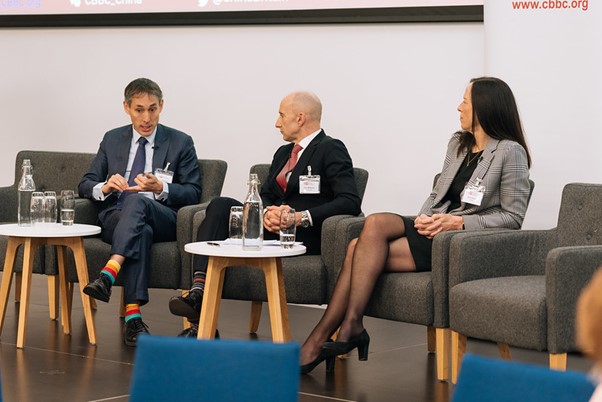
The first panel session of the day was on UK-China Relations and Trade Opportunities in the post-Covid Era
Professor Xu Bin, Professor of Economics and Finance and the Wu Jinglian Chair Professor in Economics at China Europe International Business School said that the outcome of the recent Party conferences in Beijing is stability. “The appointment of Premier Li Qiang and Xi Jinping securing his third term will lead to less uncertain policies in China and around the world, and that will have positive implications,” he said.
John Edwards, HM Trade Commissioner, China & Hong Kong, said that only in November 2022, China was potentially facing years of Zero Covid and closed borders but in a short space of time, things are returning to normal. “Although 2022 was disruptive for business in China, it is worth remembering in 2020 and 2021 there was no place better to be than in China whilst the rest of the world was locked down,” he said.
John Edwards stated that China’s opening up of its financial markets is going to be huge and that Net Zero is a great opportunity for many businesses. In the education sector, vocational education is a big market as the Government increasingly focuses on vocation training. In China there are already half a million Chinese students in transnational education programmes.
Qing Pan, President of Jaguar Land Rover China explained that although China has been the largest car market in the world for the last decade, it is often overlooked that China is also a leader in battery technologies for cars and environmental standards.
HSBC’s Janet Henry went on to discuss risks of a deteriorating political relationship. “Markets can change their minds and can be volatile. There are going to be certain sectors where trade between large parts of the West and China will be difficult. But there are vast amounts of sectors which are not going to be constrained,” she said. “If we don’t get global trade deals done there will be intra-regional trade deals in Asia – other regions will sign up and take that market.”
Professor Xu Bin said that Xi Jinping has moved away from a focus purely on economic development and efficiency at all cost. He went on to say that Xi has used the term ‘open regionalism’.
“Xi Jinping sees the future of the world as very different to the pre-2008 globalised world. He sees it focused around two mega regions - one around the US and one around China. They are open to doing business with each other but there will not necessarily be directly friendly or positive relations between the two countries”.
“China and the US will have difficulty reconciling with each other, so I do see a trend towards a decoupling between US and China’s economy. But that provides a lot more opportunities for the rest of the world and countries like the UK,” he remarked.
Earlier in the week the Financial Times reported that Chinese car manufacturer BYD did not have the UK on its long list of locations to set up manufacturing, mostly because of Brexit. John Edwards said that its true, Brexit will have an impact on certain sectors.
“Does it affect our ability to export to China or import from China? No. Does it affect some Chinese investors coming into the UK? Yes. Will it affect companies looking to manufacture in the UK? Yes.”
However, he said other concerns such as UK corporation tax or how welcome investors are, and other geo-political issues will also play just as big a part in those decisions.
From the China side, Professor Xu Bin said that China is likely to be “more laid back” when it comes to offering favourable policies to attract FDI. And Janet Henry said that China’s economic bounce back post-pandemic is likely to be more stable and long term. “I am broadly in positive territory,” she said.
Qing Pan was also “cautiously optimistic” about the economic outlook in China. “This year could be the year of consolidation and over supply but now the consumption base will be broader,” he said.
“It will take some time for the confidence of Chinese consumers to come back,” argued Professor Xu Bin. The average Chinese family has spent some of their savings in the last three years and some are not completely clear of the economic shock. But letting the economy grow relatively naturally from 3% to 5% is not such a difficult task, he said.
John Edwards said that he is also positive about UK-China relations, but it is important to get that message out. “Business people need to be more vocal and supportive [of UK-China trade] in public. If the public see ministers going out and visiting China then this will help the image,” he said.
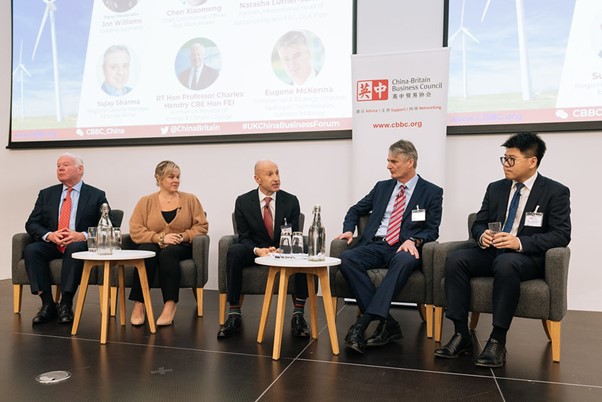
The second panel session of the day explored UK-China Net-Zero Partnerships
The second session of the day was on UK-China Net-Zero Partnerships. Chen Xiaomeng, Chief Commercial Officer at Red Rock Power explained how they had provided turbines for two large-scale offshore, and three small-scale, onshore wind projects and received funding from China’s State Development and Investment Corporation.
“The attraction was that the market was a new market with a lot of opportunity in relation to offshore wind,” he said. “And the UK is at the forefront of these technologies.”
Eugene McKenna, Commercial and Strategy Director, Hydrogen Technologies at Johnson Matthey said that his company’s global ambition “is to get the world to Net Zero” and to do that you need a presence in China. “China produces a lot of carbon dioxide, so we need to be in there,” he said. “We are working on decarbonising the modern processes and using fuels such as Blue Hydrogen”.
McKenna explained that the technology is developed in the UK and then licensed in China. “China is at the forefront of deploying fuel cells,” he says. “Half of the world’s fuel cells deployed are in China.”
Rt Hon Professor Charles Hendry CBE Hon FEI, Former UK Minister of Energy & Climate Change, said that it was clear from his dealings with China a decade ago, that China was keen to lead technology rather than simply take Western technology and sell it back. China’s commitment to doing so can be seen from their investment in the area, he explained. The United States has invested USD $140 billion in decarbonisation, the EU has invested USD $180 billion, whilst China has invested an impressive USD $540 billion.
“Fundamentally this is about partnerships,” said Hendry. “The UK started its offshore wind production a decade ago and we now produce 13 gigawatts. China has 25 gigawatts.”
Sujay Sharma, Regional General Manager at bp pulse AsPac, said that China is also a leader in electrification. “It has the largest electric car parking network; it pushes for Net Zero in greening of the grid via solar and wind and pushes for electrification for fleets, as well as in the private B2C sector. Foreign businesses in the sector such as EV production and charging has seen support from the government, and China has doubled its number of charging stations from 2.6 million to 5 million during the backdrop of covid challenges.”
Natasha Luther-Jones, Partner, International Head of Sustainability and ESG, DLA Piper
explained that there was a huge need for ‘Just Transition’ when it comes to moving from dirty to clean energy in a manageable way for poorer economies.
“In Africa there is a balance - for renewable energy - but also a need for power and an income,” she said. “People accepted that you can’t have us, who have progressed quite far in this area, pushing Net Zero on everyone else.”
Funds to compensate those who suffer from environmental damage will be a hot topic in the coming year, said Hendry as the coming COP conference in the UAE “will not just be for the powerful but the powerless”, he said.
Moderator Jon Williams asked if there is a political risk to having Chinese investment in the UK’s power supply. But Chen Xiaomeng of Red Rock said that 95% of the 80 staff they have are locals and the equipment they use has no security issues attached to it. The biggest threat to the industry, said Chen Xiaomeng was inflationary pressure and price increases.
“We should be welcoming investment,” said Professor Charles Hendry. “We want to attract investment in the EV supply chain. China leads in terms of tech and innovation and so they are the natural partner, and we need to secure investment.”
‘TLC’ - transparency, longevity, and clarity - are essential said Professor Charles Hendry. And we have to work harder than before as changing Government, Brexit and competing with new investment incentives from the US and the EU will make it harder for the UK to attract that investment.
However, Natasha Luther-Jones said that as Britain is a world leader in on-shore wind generation, the US and EU are looking to us to learn and therefore investment will likely continue.
“The issue is there is not enough private sector investment available. We need companies like Red Rock to invest - even as a minority,” she said.
The impact that the government make is not to be underestimated says Professor Charles Hendry. Government incentives for investment is essential. “Hawkishness in Government creates a nervousness, but all the messaging now is that we want a constructive relationship with China, and nowhere is that more apparent than on Net Zero and de-carbonisation.”
CBBC’s Chief Executive, Andrew Seaton joined in the discussion to say that CBBC is trying to counter this negative impression. “It’s evidently a clear case for the UK to be doing business in China in areas which don’t cause us national security concerns and to be cooperating in areas such as Net Zero,” he said. With John Edwards adding that we don’t talk enough of the British global success story that is off shore wind.
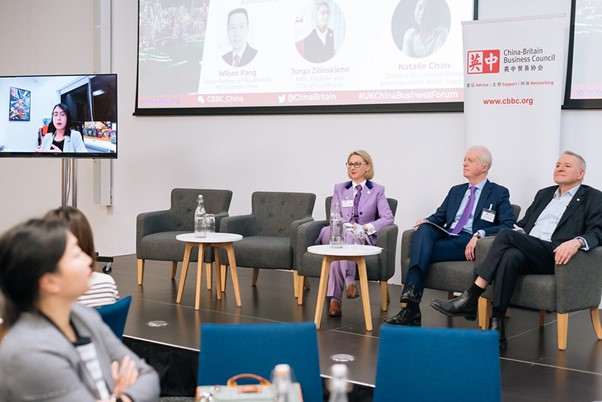
The third panel session of the day focused on Seizing New Opportunities in The Greater Bay Area (GBA)
At the third panel session of the day: Seizing New Opportunities in The Greater Bay Area (GBA). Delegates were introduced to the area by Wilson Pang, Senior Partner, KPMG Advisory for Southern China. Detailed insights into the geographical and economic situation of the Greater Bay Area and future plans were produced.
Wilson Pang explained that the current GDP of the combined Greater Bay Area already accounts for USD $1.9 trillion, but it plans to overtake the USD $2.5 trillion of the Tokyo Bay Area by 2025 and hit USD $5 trillion: making it larger than the GDP of all the ASEAN countries combined by 2030.
Andrew Davis, Head of Investment Promotion, UK Office for Invest Hong Kong explained that it was more than a Government scheme. What was previously known as the Pearl River Delta is now called the Greater Bay Area and benefits from allowing access to a much bigger market than just Hong Kong. There are 8 million people in Hong Kong, but 70 million in the GBA.
Andrew Davis said that several UK firms, including robotics companies from both the University of Cambridge and Imperial College London working on robotic surgery, have moved to the GBA. Robotics, finance, high-tech and innovation all create an industrial system that benefits from the region’s unique national and international transport hubs - known as Dual Circulation.
Natalie Chan, Director of Location Based Entertainment, APAC, Hasbro, explained that the region’s integrated structural system was one of the main reasons Hasbro have their regional hub in the GBA. From manufacturing to shipping, software to logistics, professional and financial services and standards - it is all found in the same area.
Jurga Zilinskiene MBE, Founder and CEO of Guildhawk, explained the reasons for locating in the GBA, thanking Invest Hong Kong and CBBC for their support in making it happen.
She said that collaboration and sharing of Intellectual Property was important for her company to solve problems. “We need collaboration from different players – tech, academia, and other partners. It is exciting to find the willingness to collaborate and problem solve in this area,” she said. She went on to say having the commercial process and financial investment opportunities in the same area really creates an environment that can advance technology.

Delegates enjoyed the chance to network and exchange ideas at the Conference
Following a lively lunch in which delegates enjoyed the chance to mingle and network amongst themselves as well as with speakers, the Forum resumed with a choice of four afternoon Breakout Sessions. These sessions spanned a range of topics relevant to those in attendance across all industries and at all stages on their China market journey.
The sessions explored topics including: ‘British Brands and China’s New Generation of Sustainable Consumers’; ‘Sustainable & Diverse UK-China Education Partnerships’; ‘UK-China Partnerships in Green Finance and Sustainable Investment’; and ‘Tech for Global Good: UK-China Collaboration in Science and Technology’: and gave delegates actionable and sector-specific takeaways from leading industry experts.
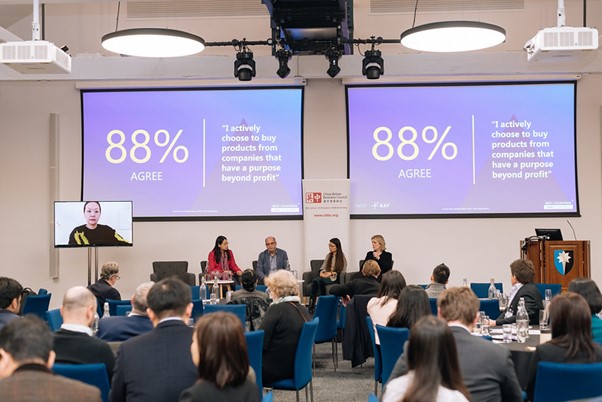
Delegates and Speakers at the afternoon Breakout Sessions
Following the Breakout Sessions, delegates enjoyed an opportunity for informal networking, drinks, and nibbles at the end of the day.

Delegates and Speakers enjoyed the chance to network over drinks at the end of the event
The UK-China Business Forum 2023 proved a wonderful opportunity for members of the UK-China business, education, and cultural communities to reunite, exchange knowledge and ideas, and ready themselves for a productive year ahead.
The event was made possible with the support of our Sponsors: HSBC, bp, Invest HK, and Oxford International Education Group. As well as our Partners: China Chamber of Commerce in the UK, China Europe International Business School (CEIBS), Manchester China Forum, Renewable UK, Society of Motor Manufacturers and Traders, TheCityUK, TechUK, Universities UK International, and the UK Government.
Learn more about the UK-China Business Forum 2023, including the full agenda, list of speakers and speaker biographies here.
Browse photos from the event here.
We hope to see you again soon at more events hosted by CBBC. Keep up to date with our events calendar here. Learn about our Membership offer here. And for further enquiries related to the event please contact us at Enquiries@cbbc.org.